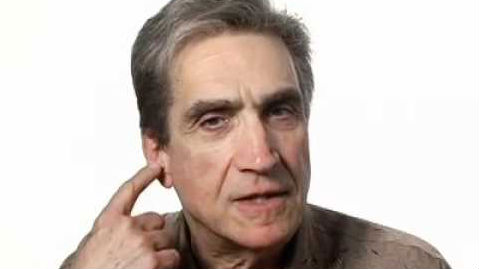Poetry Is Not an Ornament. It’s at the Center of Our Being

On the occasion of National Poetry Month, Big Think spoke to Robert Pinsky, the 39th Poet Laureate of the United States, about the value of using poetic language in everyday life. Pinsky founded The Favorite Poem Project in 1997. We asked him about his ambitions for this project.
I’m proud of the videos at www.FavoritePoem.org. They show people of a wide variety of professions and ages. You can see a construction worker reading Whitman. And talking about Whitman, you see a Cambodian-American kid in California reading a Langston Hughes poem, talking about Langston Hughes. There’s a U.S. Marine with a Hispanic surname who talks about Yates’ politics and reads that poem very well.
I’m proud of the site partly because it doesn’t involve marketing poetry or missionary work for poetry, which I’ve gotten kind of tired of. I don’t think I did tell anybody to read poems. The site shows people that wanted to read poems and who wrote sentences to me saying they had a poem they loved. This breaks the stereotype of Americans not liking poems. These people found me. I didn’t find them. And I think you’ll find that the project may correct well-meaning teaching that makes people feel the poem is a challenge to say something smart. Nothing wrong with that, smart things are good, but you have to understand that a poem is a work of art and its purpose is not to make you feel puzzled, but to sound great when somebody says it aloud. And those people say a poem in a way that an actor couldn’t, and the poet couldn’t, and the critic couldn’t. They show you something central and fundamental, which is a person enjoying reading a poem.
Do all of the poems go online or do you have a selection process?
The way the Project works, I have almost no money, there’s no advertising budget. Whenever I’m interviewed, I mention that we’ll accept an email, mention the address. Newspapers have it. And we got thousands of letters in the heyday of the project. And it’s not a poll. People write a few sentences about why they love a particular poem. And out of, at the time I think it was 18,000 letters, Project Director Maggie Dietz and I, my co-editor, we selected ones to put in anthologies. There have been three anthologies published by Norton, and we selected which ones to make videos of.
So there was editing and selecting, and as for advertising, unlike a foundation we had virtually no ability to advertise. And I was very pleased when Life Magazine did a story about the project and one of the banners or running heads was a woman saying, “This project makes me feel like I’m a member of the secret society.”
Why would you say that the project has become such a powerful teaching tool?
If you’re a student in high school or middle school or even elementary school or college, you can see children, old people, people of many professions, many accents expressing a personal, individual connection with a particular poem or work of art and it’s human nature to see someone do that and it’s like watching someone eat something that tastes good or watching someone dance. The possibility goes up that you would want to taste yourself.
So finding something that you would like to say aloud is, I think it’s the core of human intelligence, it’s quite fundamental.
Tell us about the poetic mindset. How does poetry or the act of writing a poem or speaking a poem help us to distill our experiences in a unique way that other forms of communication don’t allow for?
I think art is not an ornament or refinement at the fringes of human intelligence. I think it’s at the center. It’s at the core. In a famous classical tag, “The animal is pathetic. Its teeth aren’t very good weapons. Its claws are almost useless as weapons. Its fur grows in kind of silly patches here and there on its body, but it has thrived and even dominated. It may destroy the world. It can do this because it can communicate, not only amongst peers, you can communicate with your ancestors and your descendants. And before we could do that with digital memory or printed memory or written memory, we did it with some combination of what we now divide into dance, song and poetry.
And that hunger that ability that craving for art in relation to memory is right at the center of us. And poetry, we use our own body to make it. There is no fiddle, there is no paint, it’s the air that comes out of your body shaped in ways that have evolved and that are controlled by our brain.
So how would you say that poetry is vital to education? Why should it be taught in schools?
The best argument for teaching poetry is to have a three-year-old or a four-year-old read Dr. Seuss, or Walter De la Mare or Robert Louis Stevenson or Edward Lear and to feel how the child and you are engaging in something that’s really basic to the animal, which is passing on in these rhythmic ways, something that came from somewhere. And it’s from the old ones to the new ones. It’s from the past and you know my kid or grandkid is going to pretty certainly be alive when I’m gone. And I’m reading Robert Louis Stevenson, you know, or Dr. Seuss, who are older than me. And that’s what education is. It’s a Latin word that means to lead out. And you’re leading the three-year-old or four-year-old out into what the old ones can do. Hey, they do something pretty good.
Where do the poetic skills come from and how can you harness and nurture those in a child?
The best thing I know of about teaching art is in William Butler Yates’ great poem, “Sailing to Byzantium.” He says — in the first draft he said, “There is no singing school, but studying monuments of its own magnificence.” He doesn’t say there’s no singing school but going to an MFA program or to Julliard or to Conservatory. He says the way, indeed the only way, you learn singing or any other art is to study, not just sample or be exposed to, but to study. Not just things that are pretty good or not bad or that are in fashion this year, but monuments of the arts magnificence. And that’s how you learn something.
If you want to make films, you’ll watch Kurosawa. If you want to play a violin, you listen to Seghetti. Same with somebody who has the ambition to play in the NBA. I watch a basketball game; I enjoy it. Somebody who really wants to learn to play is studying whatever is most magnificent that’s going on out there.





